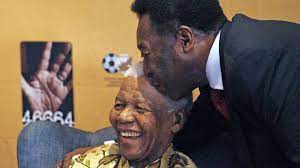Edson Arantes do Nascimento or Pele who passed away at the age of 82 had a life of many parts but his connection to Africa as one of the first few blacks to dismantle the racial stereotypes of the 20th century has been very well documented.
Africans, both notable and ordinary fans of the Brazilian have not been left out of the flurry of mourners paying tributes to one of the most recognizable figures in world sport.
Although football was brought to Africa well before the likes of Pele and his football charisma graced the pitch with their consummate skills and style, the continent was captivated by the player, the man and his story of being born as a black man on the peripheries of the racial structure which characterized Brazil and much of the world in the first half of the 20th century.
In the words of Kenyan president William Ruto, Pele’s story dared millions of Africans to dream big about smashing stereotypes about race and social class to excel not only in sport but other areas of human endeavours traditionally dominated by people of other hues and social stratus.
Writing to his departing and incoming Brazilian counterparts Jair Bolsonaro and Luis Inácio Lula da Silva respectively South African president Cyril Ramaphosa said Pele, a three-time world cup champion (1958, 1962 and 1970) would be remembered in Africa as an inspiration on and off the pitch.
Ramaphosa said aside from entertaining millions of Africans while on the pitch, his off-field social work to improve the conditions of the poor in his country and internationally, provided the main inspiration for many who saw his imposing story from a backstreet boy in slums of the city of Tres Coracoes to global superstar status as something to contemplate and even emulate.
In recognition of the power of his charisma to bring people together, he was appointed Brazil’s Sports minister between 1995 and 1998 and during this period visited South Africa and met late President Nelson Mandela.
The fact that both men expressed profound admiration for one another spoke about how their common causes did a lot to change the course of history for many whose lives were touched by the pair.
President Ramaphosa said: “During the eight decades of his life, Pelé not only filled football stadiums with exhilaration but he filled hearts and homes with hope and the knowledge that adversity was surmountable…He was a global inspiration who embodied the best that sport has to offer as an exhibition of physical endeavour and as a means to transform individuals and entire societies from within”.
The South African leader paid homage to Pele’s endurance and impact which inspired resilience and said such was the penetration of his charm on others that death will rob multiple generations of people worldwide who were touched by his life even if they never set foot in a stadium to watch a game of football.
At the height of his glory, Pele made several trips to Africa with his famous Santos team, visiting Nigeria, Ghana, Sudan, Kenya, Mozambique and Zaire now the Democratic Republic of Congo among others.
There are even fables about how during his trip to war-torn Nigeria during the Biafra separatist conflict which began in 1967, hostilities had paused when combatants on both sides of the battlefield divide realized who was in town.
All they wanted there and then was to revel in his on-field magic and for 48 hours the guns fell silent in honour of the man who would come to be regarded as the world of sport’s greatest ambassador of peace and social justice.
The protagonists had agreed to suspend hostilities when a Santos team led by Pele touched down in Nigeria ahead of their showdown with the national team.
According to witnesses, such was the respect both sides had for the football-induced truce that both sides worked hand in glove to provide security for the players and the crowds at the Lagos stadium, briefly uniting Yorubas, Hausas and Igbos who were pitted against each other in a bitter civil war. But hours after the game which ended in a stalemate despite Pele scoring two goals which were met with appreciation all over the stadium, hostilities erupted once again as the drumbeat of war sounded from the battlefronts.
”He was the Maradona, Messi and Zidane of his generation all rolled into one towering figure” said Olayemi, a Nigerian admirer of the Brazilian spanning five decades.
”As a black man he was fixated with Africa, because Africa was in him culturally” said another admirer writing from South Africa.
He was emulated by players on the continent and none more so by Abedi Pele one of Ghana’s best ever players who adopted the Brazilian’s moniker to indicated how much of an inspiration the world cup winner was in shaping his career.
Africa’s love and respect for Pele was reciprocated by him, identifying himself with the historical and cultural ties to the continent from where he believed all black people originated.
It spoke about his Afrocentricity when he named Nigeria’s Jay Jay Okocha, Liberia’s George Weah, Cameroon’s Roger Milla, Ghana’s Abedi Pele and Senegal’s El Hadji Diouf as his picks among the 125 Greatest Living Footballers (FIFA 100) in 2004.
He was also obsessed with Africa winning the greatest prize in world football and even once predicted that a country on the continent would do so.
While this is yet to happen 45 year since he dared dream for the continent, the player who scored 77 goals in the shirt of the Brazilian national team, and over 1, 200 career goals spanning 21 years will always be fondly remembered in Africa as one who inspired black consciousness and self-confidence everywhere.
WN/as/APA


